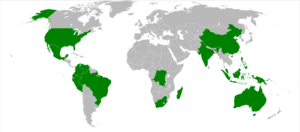 Image via Wikipedia
Image via Wikipedia8th ABS Working Group Meeting
Montreal, Canada
11 November 2009
Day 2 Update
Asia-Pacific Countries Regroup on Biological Diversity Convention
By Atty. Elpidio Peria
MONTREAL, Canada – 10 November 2009 – Asia-Pacific countries who are also Contracting Parties to the Convention on Biological Diversity (CBD) re-grouped today in order to effectively fight for their rights in the on-going negotiations for the International Regime on Access and Benefit-Sharing here in Montreal, Canada.
“...We are now entering into a crucial stage of the negotiations. Developing countries from the Asia-Pacific region wish to play an active role in these negotiations. Hence they have felt the imperative need to discuss and address their commonality of interests through this newly created Like Minded Asia Pacific Group (LMAPG),” said Gurdial Singh Nijar of Malaysia, who was designated as spokesperson for the new group.
The move of these developing countries in effect left out Japan, Korea, Singapore and Thailand to fend off for themselves in the negotiations for a treaty that will stop biopiracy.
They however committed to work closely with other developing countries organized as the Like-Minded Megadiverse Countries (LMMC), GRULAC and the African Group.
This is the first time that this re-grouping of regional groups of countries has happened in the Convention on Biological Diversity.
Usually, countries attending meetings in the United Nations system are divided into key regional groups – the African Group for the countries in the continent of Africa, the EU, for the 27 countries in the European Union, the Eastern and Central European countries for countries which were formerly part of European Countries behind the Iron Curtain, the GRULAC for Latin American and Carribean group of countries, and the Asia-Pacific.
Developing countries from the Asia-Pacific group in the CBD pushing for a more active stance in the negotiations on access and benefit-sharing have labored for years under the influence of Japan, which is the number one trading partner and donor of most of the countries in the world, including the Asia-Pacific region.
The delegate from Malaysia clarified that this move of the Asia-Pacific group of countries is to have a common stand on the issues before the ABS Working Group, especially now that the negotiations for the instrument to ensure benefit-sharing from the use of genetic resources has reached a critical stage.
Malaysia also emphasized that this does not mean that the Like-Minded Megadiverse Group has split up, but rather, these developing countries in the Asia-Pacific region, number ing over forty countries , are now moving in one direction and are in a position to support the stand of the Like-Minded Megadiverse Countries or LMMC.
The LMMC is a grouping of around 17 countries which hosts 70% of the world's known biological diversity and includes Asia-Pacific countries China, India, Indonesia, Malaysia and the Philippines as its members.
This group, currently led by Brazil, has consistently called for a legally-binding treaty that will ensure the flow of benefits to the countries of origin of these genetic resources.
Brazil expressed satisfaction in the formation of the new regional group and is grateful for their support.
The discussions for the day delved on allowing countries and various observers to give new text on the various elements of the International Regime on ABS, particularly on fair and equitable sharing of benefits, access to genetic resources and compliance.
Right after adjournment of the plenary, two contact groups were formed to negotiate a document that will eventually contain provisions that will deal with traditional knowledge and capacity-building.
A contact group is a smaller grouping of countries that will meet from time-to-time to exchange views and negotiate on the outcome of a document, which will then be adopted by all countries attending the meeting on its last day.
Only the Contracting Parties to the Convention can make interventions that will matter in the outcome of the document.
The discussions proceeded within the day, but all were preliminary discussions as what had happened was that countries and observers mainly merged or cleaned up the text that is already on the table, including statements of position that were made on the floor on the first day of this session of the ABS Working Group.

![Reblog this post [with Zemanta]](http://img.zemanta.com/reblog_e.png?x-id=13cad73d-b2f3-4c8c-a1ba-c31cc88ba361)

![Reblog this post [with Zemanta]](http://img.zemanta.com/reblog_e.png?x-id=a3e670a8-84b7-46e8-9196-bda7f904d986)


